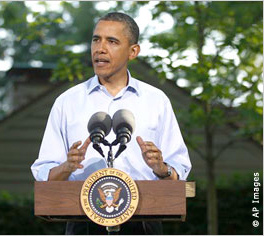G8 Nations Agree to Promote Economic Growth, Job
By Merle David Kellerhals Jr.
WASHINGTON, DC – President Obama says leaders of the Group of Eight (G8) nations agreed at the 2012 Camp David Summit to promote further economic growth and job creation that will stabilize and strengthen their economies for the future.
“For the past three years, our nations have worked together and with others — first to rescue a global economy from free fall, then to wrestle it back to a path of recovery and growth,” Obama told journalists May 19 at the closing of the two-day summit held about 100 kilometers (62 miles) outside of Washington at the presidential retreat Camp David.
The G8 advanced economies meeting May 18-19 included Britain, Canada, France, Germany, Italy, Japan, Russia and the United States. Obama immediately left Washington after the close of the economic summit to open the 2012 NATO Summit being held May 20-21. Obama is hosting the event in his hometown of Chicago.
While saying that the global economy during the past three years has been tested at times by shocks, both manmade and from natural disasters, the leaders agreed that expanding jobs and growth offer the best hope for the future. Obama said the current serious situation in the eurozone affects the U.S. economy and others far removed from European nations, which is why coordinated, collective action is essential.
Obama said that the economic situation facing Europe is more complicated than the economic recovery the United States faced in his first three years in office. But the U.S. recovery gives some lessons that the European nations should follow as they work for their recovery, Obama said. He said there is a political and economic dilemma facing Greece and slow growth and high unemployment in several other eurozone countries. Resolving those issues, Obama said, requires coordinated agreement among the 17 nations that comprise the eurozone.
“We recognize that and we respect that,” Obama added. “The direction the debate has taken recently should give us confidence. Europe has taken significant steps to manage the crisis. Individual countries and the European Union as a whole have engaged in significant reforms that will increase the prospects of long-term growth,” the president told journalists.
Every leader meeting at Camp David understands the stakes, knows the magnitude of the choices they have to make and acknowledges the enormous political, economic and social costs if they do not, Obama added.

President Obama briefs reporters at the conclusion of the 2012 G8 Summit.
In addition to addressing the economic situation facing the eurozone nations, the G8 leaders also agreed to address climate change, in part by agreeing to reduce emissions of short-lived pollutants. And in the face of increasing disruptions in the global supply of oil, the leaders agreed to more closely monitor world energy markets and be ready to call on the International Energy Agency to take such action as needed to ensure that the market remains supplied fully and in a timely fashion, Obama told journalists.
“We also announced a new alliance on food security with African leaders and the private sector as part of the effort to lift 50 million people out of poverty over the next decade,” Obama said. “We discussed our support for a sustainable [Afghanistan] economy as we wind down the war, and we reaffirmed our support for the democratic transitions under way in the Middle East and North Africa.”
The future course of relations with Afghanistan and ending the long-running operations there will be a significant topic of the NATO nations and allies and friends also attending the summit in Chicago. And Obama said that next week European leaders will gather to discuss their next steps on the eurozone.
In June, the nations of the Group of 20 advanced economies will meet in Mexico.

G8 leaders at the photo session for the Camp David Summit


